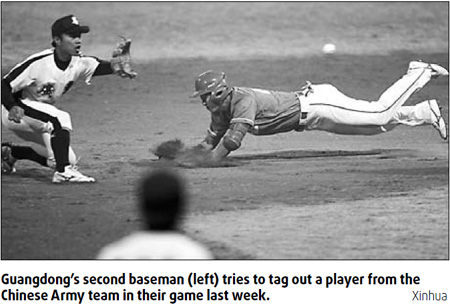
|
SPORTS> China
 |
|
Chinese softball and baseball in limbo
By Tang Yue (China Daily)
Updated: 2009-10-30 10:02
 "I'm afraid it is not only our team at risk. Who will pay for a team of so many people without returns, especially after the sport was kicked out of the Olympic Games?" Yu said. "Who knows whether there will be less and less teams in the coming years?" "In a moment, you can dissolve a team but it is impossible to start one overnight." Baseball faces the same dilemma. Though the national team's debut at last summer's Olympics was highlighted by a historic victory over Chinese Taipei, the national league, launched in 2002, has failed to draw much attention. The opening match of this season in Tianjin, whose team has been crowned champions the past three years, only received a TV audience rating of 0.5 percent while the city's soccer side enjoyed a 6.7 percent rating the same weekend. According to Shen Wei, the director of the baseball department under SGAS, a financial squeeze is hampering the development of the sport in China. "It requires at least thousands of yuan for a teenage player. It is much more expensive than table tennis, badminton and basketball," Shen said. Though reluctant to state figures, she said she "just doesn't have enough money to do as much as we want". Softball and baseball, which enjoy great popularity in countries like America, Japan and Australia, were in virtual obscurity in China until 1996 when the national softball team won silver at the sport's debut at the Atlanta Games. China lost to the hosts in the final. "We had nothing on the field at that time, no beautiful polo shirts. At home we had little financial support and few fans," Li Minkuan, the "godfather of softball" and coach of the runner-up team, said. "But we never gave up. Instead, we trained harder because we had to fight for survival. Victory was the only thing we could gain. "At the lowest point, there were only six softball teams in China and only 11 in 1996. I had only a pool of less than 200 players to select from for the national squad," Li, who was the head coach from 1976 to 1997, said. Under his guidance, the team gained two silver medals at World Championships, three gold medals at the Asian Games and reached its peak in Atlanta. However, the sport has failed to grow here since then. Only 11 teams competed at the National Games. There is no professional league and only two national championships, which means the players have only about 20 matches per year. At Sunday's final, only about a hundred fans were watching in the stands and most were friends and family of the players. "We are used to being ignored but we have been working very hard to be noticed," Wang Lihong, who pitched at the Atlanta and Sydney Games, said. "If we won gold 13 years ago, would the whole thing be better now? "I don't regret my choice," said Wang, the national coach of the Olympic team last year, said. "I really love the sport. I was away and tired but I missed it so much." she said. "I gained all my injuries, glory, successes and defeats from softball. I just felt it was destiny to do something for it," said the coach of the team which finished sixth at the Beijing Olympics last year. "I'm just worried about the future. Now it is a non-Olympic event, unlike the countries with a deep-rooted softball culture, it will surely impact the sport in China," she said. "I just hope it won't be dropped from the National Games for then it will die on this piece of land some day." However, Yang Xu, the director of the softball department under the SGAS, believes the sport's omission from the Olympics could have a silver lining. "We have always been Olympic-oriented in the past decades and have neglected the development at the grassroots level, which serves as the basis of every sport. Now, there are no Olympics so we have to shift the target to students," Yang said. He said more than 100 primary and middle schools in 12 provinces play T-ball, a form of baseball, at PE lessons. "Having a perfect combination of team spirit and individual performance, I believe the sport has a bright future in China. I hope Chinese people will feel the same joy as the Americans and Japanese do now," he said.
|